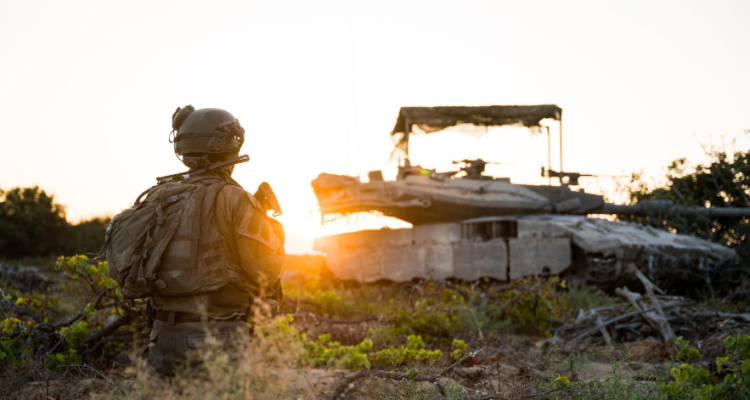‘Sadly, the IDF leadership has not absorbed the most basic lessons of Oct. 7,’ Halevi lamented.
By Yaakov Lappin, JNS
Likud Knesset member Amit Halevi in a recent interview with JNS called for a deep revision of the Israel Defense Forces’ strategic thinking and decision-making processes.
Halevi, a member of the Knesset’s Foreign Affairs and Defense Committee for the past two years, expressed serious reservations about prevailing military doctrines and the IDF’s understanding of the threats facing Israel.
His criticism is particularly directed at the IDF General Staff, which he accuses of relying on outdated concepts and failing to properly grasp ideological and regional realities regarding Israel’s adversaries.
Halevi, who is also chairman of the Knesset Subcommittee for Security Doctrine and Force Buildup, did not mince words when he spoke with JNS last week.
“There must be a revision in military thinking. This generation of senior command relies on a conceptual world that is severely lacking,” he said.
IDF leadership has not learned the critical lessons of past conflicts, he said, such as those highlighted by the 2008 Winograd Commission Report, which critiqued Israel’s performance during the 2006 Second Lebanon War.
“The lessons from that report were never fully implemented,” Halevi said, pointing to what he describes as a persisting lack of readiness of IDF ground forces, inadequate training for reserve brigades, and insufficient equipment—all issues tragically exposed by the events of Oct. 7.
Brig. Gen. (ret.) Amnon Sofrin, a former head of the Mossad Intelligence Directorate, said during a video call organized by the Jerusalem Press Club last week that divisions within Israeli policy making circles regarding the future of Gaza and, specifically, the Philadelphi Corridor, a critical area along the Gaza-Egypt border notorious for smuggling tunnels, have resulted in no decision being taken.
According to Sofrin, the Israeli government is currently split between two conflicting visions for Gaza’s future.
The first, supported by Defense Minister Yoav Gallant and IDF Chief of Staff Lt. Gen. Herzi Halevi, envisions Gaza being controlled by local authorities in cooperation with international partners, including the Palestinian Authority and Arab states.
The second, supported by Israeli Prime Minister Benjamin Netanyahu, calls for the IDF to maintain long-term military control over Gaza until a viable alternative solution emerges.
This indecision is reflected in the approach to the Philadelphi Corridor, Sofrin noted.
He added that the debate over who will control Gaza after the war is over has paralyzed any decisive action regarding this critical area.
MK Halevi expressed his frustration with what he perceives as the IDF’s inability to internalize the strategic shift necessary to address the challenges posed by Hamas and Hezbollah.
He criticized the General Staff for even considering a withdrawal from the Philadelphi Corridor, likening it to the 2005 agreement reached between late Prime Minister Ariel Sharon and Egypt, which was supposed to monitor smuggling activities in the area but failed to do so.
“Sadly, the IDF leadership has not absorbed the most basic lessons of Oct. 7,” Halevi lamented.
He accused the military of neglecting the importance of controlling key areas like the Philadelphi Corridor, where he said hundreds of tunnels have been discovered, vital supply lines for Hamas.
Halevi argued that the IDF’s failure to adapt its strategies has resulted in a situation where Israel is once again considering handing over control of critical security zones to external actors like Egypt—a move he believes would be disastrous.
“The military thought process is fundamentally flawed,” he reiterated.
“They are repeating the same mistakes, ignoring the ideological infrastructure of our enemies, and placing short-term economic and diplomatic interests above long-term security.”
The ramifications of this strategic disconnect, Halevi warned, extend beyond the Philadelphi Corridor.
He expressed deep concern over the IDF’s handling of the northern Gaza Strip, where Israeli forces have struggled to clear out Hamas strongholds in densely populated urban areas.
“The partial evacuation of the northern Gaza Strip has left our soldiers in static positions, vulnerable to guerrilla tactics,” he said.
Halevi further criticized the IDF’s approach to urban warfare, arguing that the military’s failure to fully evacuate and clear northern Gaza has allowed Hamas to maintain a significant presence there, with underground weapons caches and tunnel networks largely intact.
“This is guerrilla warfare at its most effective,” he said. “Our static presence in these areas is a recipe for disaster.”
Halevi said that under current conditions, he is opposed to an IDF ground maneuver in Lebanon to take on Hezbollah.
“The gap between Hamas and Hezbollah is a gap of hundreds of percent, not just 100%. Therefore, sending the IDF into the mountainous terrain of southern Lebanon is a dramatic situation,” he stated.
“If the military’s approach is to go tunnel by tunnel, which they call a maneuver, but the real goal is to keep going one tunnel after another, then I truly believe it’s futile and not worth risking the soldiers in this way.”





